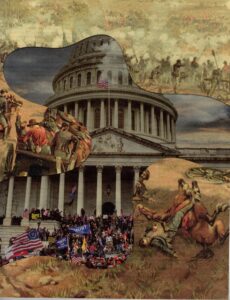
Another year draws to a close. It is time to update the situation on America’s Third Civil War. We are at the three year anniversary of an issue of The Atlantic with the front cover “How to Stop a Civil War.” The Christmas New York Times Sunday magazine issue had an article by David Blight, Yale University with the title “The Irresponsible Conflict: Was the Civil War Inevitable? As America Struggles through another Era of Deep Division, the Old Question Takes on New Urgency.”
This is not my first blog on America’s Third Civil War. For example:
America’s Third Civil War: An Update December 13, 2020
America’s Third Civil War is unfolding in unexpected ways. Previously I had blogged that the 2020 Presidential election would be our Battle of Gettysburg (He Really Could Stand in the Middle of 5th Avenue, Shoot Somebody, and Not Lose Voters April 1/2020)
As it turns out, I was correct. Just a few weeks after that blog, the Confederate flag would wave in Capitol rotunda on January 6, 2021, the furthest advance of the Election Day campaign to overthrow the government. Since then the tide has subsided. There has been a steady stream of released transcripts. Indictments are looming in 2023 for the insurrection organizers (2023: The Year of Indictments December 22, 2022).
So let us look back on what The Atlantic was writing three years ago and what Blight wrote one week ago.
THE ATLANTIC
Jeffrey Goldberg tactfully opens his “Editor’s Note” with:
The 45th president of the United States of America is uniquely unfit for the office and poses a multifaceted threat to our country’s democratic institutions.
In my blog of December 13, 2020, I wrote about his comment that anticipates the words of Liz Chaney of the House Select committee:
I doubt that Goldberg anticipated a frontal assault on the democratic process including an attempted coup to steal the election with the support of the Minority Leader of the House of Representatives and 125 accomplices. To imagine an attempted coup by this particular President requires no stretch of the imagination.
Of course, I had no idea of what was about to occur. A mere 19 days later there would be such a coup attempt.
Goldberg: Out of our conversations, and others like it, emerged the idea for the special issue you are now reading, what we have called “How to Stop a Civil War.” … (W)e worry that the ties that bind us are fraying at alarming speed⸺we are becoming contemptuous of each other in ways that are both dire and possibly irreversible.
My blog: If these words reflect Goldberg’s assessment of the situation in December 2019, then one can only imagine what he must think in December 2020. For now the coup to steal the election temporarily has been stopped by the Supreme Court. One should expect the final stand where the last ditch effort to overturn the election will be undertaken will be when the new House convenes to ratify the vote of the Electoral College. He still thinks he can overturn the election and has roughly 126 people who will help him. The fat lady still hasn’t sung yet.
Obviously this prediction about what would transpire on January 6, 2021, proved to be correct.
Goldberg also notes that the first issue of The Atlantic was 1857 (see below)
The next two articles in the issue were covered in the earlier blogs in 2020:
“WHEN TRUMP GOES” BY DAVID FRUM December 13, 2020
The Texas Secession: Legally Dividing America December 14, 2020
I never did complete my review of the entire issue so let me take a stab at doing so here so we can glimpse the thinking of a mere three years ago. Following these articles above, there was a section on “The Forces that Pull Us Apart.”
The first article in the section was “How America Ends: A Tectonic Demographic Shift Is Underway. Can the Country Hold Together?” by Yoni Appelbaum. He quotes Candidate Trump on Twitter in October, 2019, saying:
What is taking place is not an impeachment, it is a COUP, intended to take away the Power of the People, their VOTE…
Applebaum notes Trump’s quoting a supporter’s dark prediction that impeachment
…will cause a Civil War like fracture in this Nation from which our Country will never heal.
Applebaum’s concern is the competing sides have crossed the line where each side dehumanizes the other. As to how this has happened he suggests:
…the biggest driver might be demographic change.”
To support this charge he cites a book published in 2002 by Tuy Teixeira and John Judis, The Emerging Democratic Majority, and an article published in The Atlantic in 2012, where Teixeira doubles down on that argument.
Those prognostications about the demographic changes which would sweep Democrats into power have been the subject of recent blogs here:
Demographic Deluge, Democratic Nightmare: The Emerging Democratic Majority
October 28, 2022
What will White Racists Do if the Republican Party Becomes Diverse?
October 31, 2022
Are Democrats Capable of Crafting a New National Narrative?
November 1, 2022
Already in 2019, Applebaum recognized that all had not gone according to plan in the 2014 and 2016 elections. Yet still in 2019, he concluded that Teixeira was correct but premature. He concurred with that analysis and offered as an explanation the actions the Republicans were taking to minimize the vote.
Today [2019], a Republican Party that appeals primarily to white Christian voters is fighting a losing battle… The GOP‘s efforts to cling to power by coercion instead of persuasion…
The remedy was for the GOP to reach out to these groups just as Democrats once decided there was more to be gained by not locking immigrants out of the party. Jews, Italians, and Irish had become white and everyone sought the American dream. Applebaum noted that even dissidents in American history from the suffragists at Seneca Falls to Martin Luther King at the Lincoln Memorial of Harvey Milk at the San Francisco city hall all quoted the Declaration of Independence. Even the calls for change were expression of American founding ideals rather than as a rejection of them. One notes these words and sentiments were written before Woke became the dominant cultural idea of dissidents and toppling Jefferson became the rallying cry.
The next article was “Left Behind: The Real Roots” of the Urban/Rural Divide,” a conversation by editor Jeffrey Goldberg with Tara Westover. The conversation focused on the economic disparity between the poorest states – which voted for Trump in 2016 – and the richest states – which voted for Clinton in 2016. Democrats represent districts responsible for two-thirds of the national GDP. Westover observed a strong tone of condescension between the urban centers which have benefited economically from the technological change and the rural areas which have not.
Needlesstosay, the very tone, attitude, and vocabulary of the elitist Woke have become one of the great strengths of the Republican Party.
There are many more articles in that issue of The Atlantic, too many to review here.
During 2022, there were multiple articles continuing this theme of the Civil War. In general terms, they emphasize the reality of two houses in a single state struggling barely to remain together. Here are some prominent examples:
“The Abortion Battle May Be a Precursor to Even Larger Struggles by Fareed Zakaria (May 5, 2022, CNN and contributing editor to The Atlantic. He cites a study of America’s cultural values that maps them by counties. The result is one country that would fit comfortably with Northern European Protestant countries and the other closer to Nigeria and Saudi Arabia.
“Battle Over Abortion Rights Threatens to Deepen America’s Divide” by Peter Baker (May 7, 2022, NYT, print). His opening lines are:
For years, the United States has been drifting further apart, less a single country than an uncomfortable marriage of vastly disparate cultural and political entities…
It is a world where the loudest voices dominate the conversation and in effect “Come let us reason together” is impossible.
“America May Be Broken beyond Repair,” by Michelle Goldberg (May 28, 2022, NYT print). She cites an odious commercial by Blake Masters, who later weakly lost the Arizona Senate race, as an example. She then refers to the book Divided We Fall by anti-Trumper David French on various scenarios in which the dissolution of the country might occur. (See my blog Will California or South Carolina Secede First? (September 25, 2020).
“America Is Growing Apart, Possibly for Good: The great “convergence” of the mid-20th century may have been an anomaly” by Ronald Brownstein (The Atlantic, June 24, 2022 newsletter). In this article, not only is the divided nation model acknowledged. This time the Red States (Confederates) will seek to impose their values through legislation and the Courts on the Union States.
DAVID W. BLIGHT

Blight’s article is more of an historical essay than a politic op-ed piece which makes sense since he is an historian (= person of history in Woke). Most of it is about 1857 and the Dred Scott case (and the year The Atlantic was founded).
In addition to the historical analysis, Blight does comment on the present situation.
Recently, it has become disturbing common to hear Americans wonder aloud whether we are headed for another breakup of some kind.
He cites polls showing huge percentages of the Democratic and Republican voters favoring some kind of “secession.” The Second Civil War historian then quotes a NYT Opinion contributor who concluded that “there appear(s) to be no major or effective movement to counter polarization.” Once again we can see the need for a new national narrative and for the need of historians to take the lead in crafting one.
Blight takes aim on both sides:
A strained insistence on conformity and correctness of thought, language and behavior by the left and the right also seems to have rendered respect, grace and honest communication across political lines a thing of the past.
Blight is a college professor of history at Yale. He is in some ways on the frontlines of this dilemma. It would be interesting to know how he has dealt with these issues in his own classrooms … assuming that it contains students from both sides.
Blight concludes:
…it might be said that our country is already in the midst of a slow, low intensity civil conflict. Will it bring about something more violent and destructive?
Presumably he means than what happened on January 6, 2021. After all, back in the Second Civil War, battles were large-scale with dead and wounded in the tens of thousands at each major encounter.
Most of the remainder of the article is about the 1850s and the Dred Scott decision. Blight notes in passing that the Confederates acknowledged that Lincoln really had won and the election had not been stolen. One may add that back then, the Confederates then withdrew much like Kevin McCarthy withdrawing Freedom Caucus members from participating in the House Select Committee, a decision that backfired as he now realizes. We will never know what would have happened if the Confederates had decided to remain in Congress and participate in the 1864 Presidential elections. Strange as that scenario may sound according to Lincoln the secession was illegal and the Confederates always were part of the United States.
Blight ends his article somewhat optimistically. The midterm elections show that “at least small majorities in many regions prefers facts over bizarre conspiracy.” Whether that dynamic will remain true cannot be known until future elections are held. Otherwise he wonders if it is 1857 all over again. That year preluded the Second Civil War; will 2021 prelude the Third?
As someone who has written for years about the Third Civil War, I am strangely optimistic that the worst is over.
The 2022 election was comparatively calm despite the heated rhetoric.
The Stop the Steal candidates lost the major state and federal elections. Instead of Arizona being a beachhead for the New World Order, the TV personality who lost the governor’s race continues to make a fool of herself and undermine the cause. Otherwise all the “Stop the Steal” candidates who lost accepted their defeat without any commotion.
The Freedom Caucus is about to make a fool of itself with an onslaught on investigations even as its leaders faced probable indictment for their role in the January 6 insurrection. Compared to the House Select Committee, the Freedom Caucus investigations will look like a circus in contrast to the professional performance we just witnessed.
The insurrection ring-leader himself is going to face a series of charges that will keep him busy for years to come. In addition he has now been exposed not only as a political loser but as a business failure who has been kept afloat due to Daddy, the Apprentice, and skilled accountants. These are not the attributes of a storm-the-Capitol leader in 2024 assuming he even gets the nomination.
None of the wannabee candidates have the personality and charisma to lead a charge on the Capitol in 2024 especially when it will be under Democratic control and they have learned from 2021.
I suspect that the desire for a Civil War is mostly confined to alternate reality websites and cable shows and does not accurately reflect the nation’s mood.
Finally there are the immigrants who should be considered. Lincoln reached out to them in the Gettysburg Address. He knew his audience were not all descendants of those who had fought in the American Revolution. By standing with the Union during America’s Second Civil War they stood with those who had fought in the first one. Now all those immigrants of recent years did not come here because they want to live in a country that is cracking up and convulsed by war. People want the government to work right for them. Few will heed the call for an insurrection in 2024 in the event anyone even makes one.





